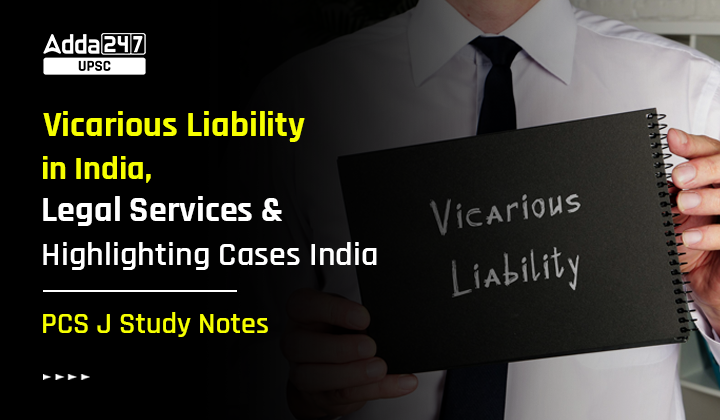Table of Contents
Vicarious Liability in India: Vicarious liability, also known as imputed liability, refers to a legal concept where a person or entity can be held responsible for the actions of another person or entity. In India, vicarious liability is an important legal principle that has been established through various judicial precedents. This article will provide a detailed overview of vicarious liability in India, including its definition, types, and implications.
Definition of Vicarious Liability in India
Vicarious liability in India is a legal principle that holds a person or entity responsible for the actions of another person or entity. This principle is based on the concept of agency, which means that a person or entity can act on behalf of another person or entity. In the context of vicarious liability, an employer is typically held responsible for the actions of its employees, or a principal is held responsible for the actions of its agents.
Some examples of these relationships covered under Vicarious liability in India are:
- Master and Servant
- Owner and Independent Contractor
- Partners in Partnership Firm
- Principal and Agent
- Company and its Directors
Types of Vicarious Liability in India
There are two types of vicarious liability in India: employer’s liability and principal’s liability.
Employer’s Liability
Employer’s liability refers to the legal responsibility of an employer for the actions of its employees under vicarious liability in India. This type of vicarious liability is based on the principle of respondeat superior, which means “let the master answer.” Under this principle of vicarious liability in India, an employer can be held liable for the actions of its employees if the employee was acting within the scope of their employment.
For example, if an employee of a company is driving a company vehicle and causes an accident, the company may be held liable for any damages caused by the accident. Similarly, if an employee of a restaurant serves food that is contaminated and causes a customer to become ill, the restaurant may be held liable for any damages caused by the illness under the vicarious liability in India.
Principal’s Liability
Principal’s liability under vicarious liability in India refers to the legal responsibility of a principal for the actions of its agents. This type of vicarious liability in India is based on the principle of respondent superior, which means “let the master answer.” Under this principle of vicarious liability in India, a principal can be held liable for the actions of its agents if the agent was acting within the scope of their agency.
For example, if a real estate agent is hired by a property owner to sell their property, and the agent misrepresents the property to a potential buyer, the property owner may be held liable for any damages caused by the misrepresentation. Similarly, if an insurance agent sells a policy to a customer and fails to disclose important information about the policy, the insurance company may be held liable for any damages caused by the agent’s actions.
Implications of Vicarious Liability in India
Vicarious liability in India has important implications for both employers and principals. Employers and principals must take steps to ensure that their employees and agents are acting within the scope of their employment or agency. This can include providing training, establishing policies and procedures, and monitoring employee and agent behavior.
In addition, vicarious liability in India can have significant financial implications for employers and principals. If an employee or agent causes harm to another person, the employer or principal may be held liable for any damages caused by the harm. This can include compensation for medical expenses, lost wages, and pain and suffering.
Vicarious Liability in India for contract of service and contract for service
In the context of employment relationships, there are two types of contracts: contract of service and contract for service. The distinction between these two types of contracts is important for determining whether an employer can be held vicariously liable for the actions of an employee under the principles of vicarious liability in India. Here are some points that explain the difference between contract of service and contract for service in relation to vicarious liability in India:
- Contract of service: This type of contract is an employment contract where the individual works for an employer under a contract of service. The employer has control over how the work is done, the hours of work, and the tools used. The employee is typically entitled to benefits such as sick leave, vacation pay, and pension contributions. Under this type of contract, the employer is usually vicariously liable for the actions of the employee.
- Contract for service: This type of contract is a service contract where the individual is contracted to perform specific tasks for the employer, but is not an employee. The individual has control over how the work is done, the hours of work, and the tools used. They are usually paid for their services on a per-task or per-project basis. Under this type of contract, the employer is generally not vicariously liable for the actions of the individual.
- Control: The degree of control that an employer has over the work of the individual is a key factor in determining whether the contract is one of service or for service. If the employer has significant control over how the work is done, it is more likely to be a contract of service, and the employer may be vicariously liable for the actions of the employee. If the individual has greater control over how the work is done, it is more likely to be a contract for service, and the employer may not be vicariously liable.
- Independent contractors: Individuals who work as independent contractors are typically considered to have a contract for service. As such, the employer is usually not vicariously liable for their actions. However, if the employer exercises a high degree of control over the independent contractor’s work, or if the independent contractor is considered to be an employee in all but name, the employer may still be held vicariously liable.
- Negligence: To prove vicarious liability in India, the employer must have been negligent in some way. This means that they must have failed to take reasonable steps to prevent the actions of the employee or independent contractor that caused harm to another person. If the employer can demonstrate that they took all reasonable steps to prevent harm, they may not be held vicariously liable.
Judiciary Related Links:
Madhya Pradesh Judiciary Syllabus
Madhya Pradesh Judiciary Prelims Result
Juvenile Justice System in India



 TSPSC Group 1 Question Paper 2024, Downl...
TSPSC Group 1 Question Paper 2024, Downl...
 TSPSC Group 1 Answer key 2024 Out, Downl...
TSPSC Group 1 Answer key 2024 Out, Downl...
 UPSC Prelims 2024 Question Paper, Downlo...
UPSC Prelims 2024 Question Paper, Downlo...





